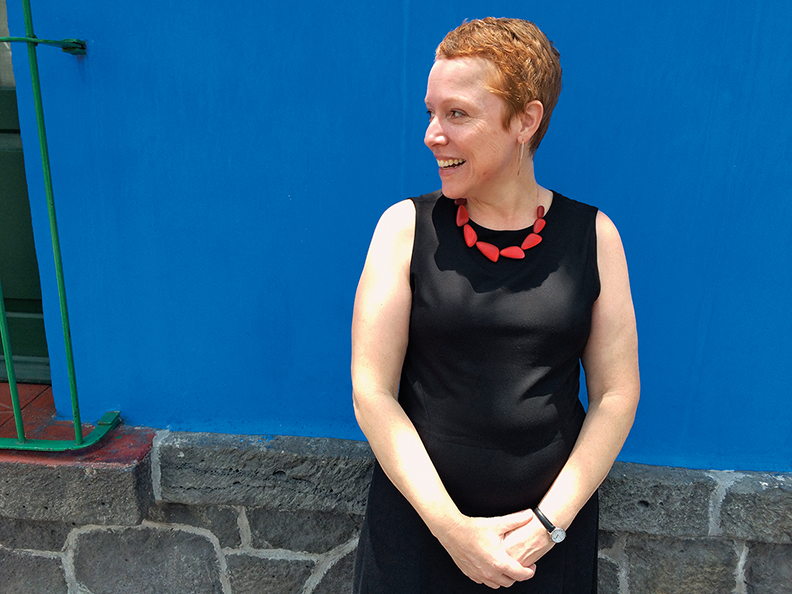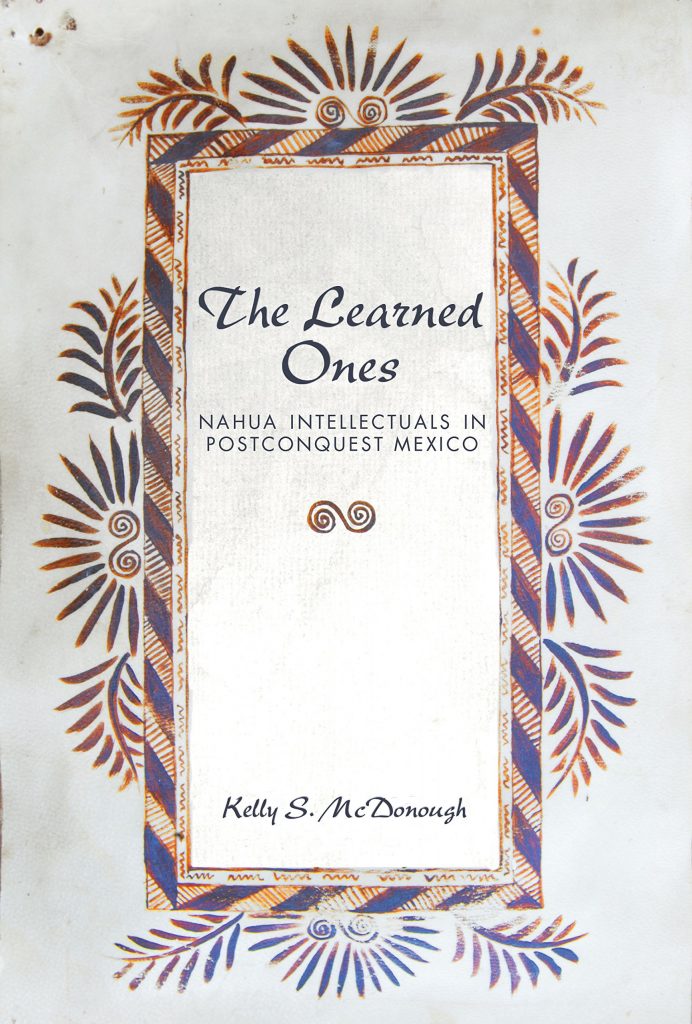
BY SUSANNA SHARPE
There is a term in the Nahuatl language that means learned person, sage, or knowledge keeper: itxtlamati (plural, ixtlamatinih), a compound of the words meaning face and to know. The concept of knowledge gleaned from experience is central in the work of Kelly S. McDonough, associate professor of colonial literatures and cultures and indigenous studies in the Department of Spanish and Portuguese. She is author of the book The Learned Ones: Nahua Intellectuals in Postconquest Mexico (University of Arizona Press, 2014), in which she writes about Nahuatl-speaking intellectuals—the ixtlamatinih—during four time periods in Mexican history: the colonial period, independence, the Mexican Revolution, and the contemporary era.
According to McDonough, “Nahuatl is one of the most widely spoken and best-documented indigenous languages in the Americas.” She explains: “When Spanish clergy arrived in Mesoamerica in the sixteenth century, they created boarding schools for the sons of noble indigenous families. There, the young men were instructed in Christianity and European customs. As part of their training, the young men were taught to write with the Roman alphabet in their own language as well as Latin and Castilian.” Since that time, McDonough writes, “Nahuas have maintained a deep engagement with the written word as one of the vehicles for their intellectual work.”
In her book, McDonough writes about Nahua thinkers who, throughout history, “took up the pen with skill—dare I say delight—as agents of their own discourses and agendas.” These protagonists range from indigenous Jesuit priest Antonio del Rincón of the colonial period, who wrote the first Nahuatl grammar, to a group of present-day Nahua who contributed to the first monolingual dictionary of the language, published in 2016 and titled Tlahtolxitlauhcayotl. Some of these scholars contributed think-pieces or statements to McDonough’s book. She emphasizes, however, that “the written word is only one facet of indigenous knowledge production; there is also oral, visual, and embodied communication.”

McDonough’s path to the study of Nahua history was somewhat circuitous, but also serendipitous. A Minnesota native, she is Irish and Ojibwe on her father’s side. Because of these roots, the theme of lost or stolen lands was familiar and captivating to her. This led to curiosity about land claims and indigeneity in Mexico, which in turn led her to research in colonial archives in Central Mexico. In her research, she would encounter Nahuatl writings, as well as the fascinating colonial-era painted codices depicting “the scholars and writers of pre-Hispanic Nahuatl-speaking cultures . . . the producers, transmitters, interpreters, and guardians of knowledge.”
Because her research in Mexico brought her into contact with Nahuatl texts, McDonough began to study the language, initially through the Instituto de Docencia e Investigación Etnológica de Zacatecas (Zacatecas Institute for Teaching and Research in Ethnology, IDIEZ). Later, she organized meetings with native speakers to share and discuss the historical materials she was working with. Through these gatherings, or Reading Circles, conducted in Nahuatl and Spanish, McDonough became immersed in the world of Nahua intellectuals. And in this setting, it was revealed that her study companions—experts in spoken and written Nahuatl—did not necessarily realize that they were part of a continuity of thinkers that began in the sixteenth century, with roots well before that.
Nahua intellectuals have largely been invisible in mainstream Mexico, says McDonough, their presence erased, as though they had utterly vanished after the conquest. Her book systematically debunks that fallacy, showing how oral tradition, literary production, and other practices have existed in continuity albeit in obscurity. In part, this is because the Mexican education system since the 1940s set about to emphasize acculturation and mestizaje, not to celebrate and strengthen indigenous identities and languages. For this reason, the fact of a vibrant community of Nahua writers and thinkers is so exciting and so significant.
Questions of indigenous writing and intellectual production are present in McDonough’s course offerings, such as Indigenous Literatures in Mexico and Colonial Cultures in Contact. In fall 2018 she will team up with Hannah Alpert-Abrams, CLIR postdoctoral fellow in data curation and Latin American studies, to teach Critical Digital Archives, a graduate seminar at the Benson Latin American Collection. She is also overseeing the digitization of Mexican judicial and parish archives, some written in Nahuatl, using funding from a Mellon Foundation grant administered by LLILAS Benson.
McDonough’s current research delves more deeply into themes that have always interested her: indigenous science and technology. She believes that academics and others tend to picture indigenous people as possessing a quasi-mystical “elder knowledge” but don’t really think about indigenous peoples as involved in rigorous research and problem solving. She is studying sixteenth-century medicinal use of plants and engineering techniques to prevent salt bed erosion. She wants to explore and complicate what science means in the indigenous context, as well as how indigenous peoples engage and view Western scientific thought and practice.
In terms of technology, McDonough is interested in tools and practices that indigenous peoples of Mexico have developed to shape and respond to the world around them. These could include the written word, water canals made of braided hemp rope, or computer applications programmed in indigenous languages related to resource management—tools and practices for solving problems.
“UT is one of the few places where I could do this work,” claims McDonough. For this, she acknowledges the key role of LLILAS Benson’s resources, digitization of archives, and support for activist scholarship. But she is clear in her acknowledgment of the other supporters of her work. In the book chapter titled “Ixtlamatinih,” McDonough writes of her Nahua collaborators, who have grown up in a country where the “intense preoccupation with the glorious indigenous empires of the past” does not preclude an “outright disdain for the flesh-and-blood indigenous people of today.”
The Learned Ones is, in part, a testament to the intellectual generosity of these collaborators—writers, artists, teachers, and thinkers whose commitment to recovering and revitalizing their language and culture gives hope for the future.
Susanna Sharpe is communications coordinator at LLILAS Benson Latin American Studies and Collections, and editor of Portal magazine.
